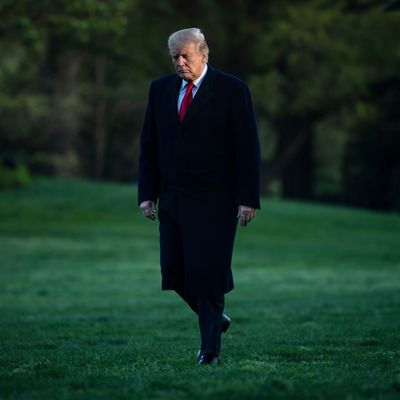
Donald Trump is running the American government like a business – or, if we’re being precise, like a criminal enterprise.
The president’s penchant for asking himself, “What would Roy Cohn advise John Gotti to do?” has been clear for some time. Last August, Trump said of the possibility that Michael Cohen would cooperate with Robert Mueller’s investigation, “I know all about flipping. It should almost be illegal.” Around that same time, the president insisted that his White House counsel, Don McGahn, was not a “a John Dean type ‘RAT’” — a reference to President Nixon’s lawyer, who testified (truthfully) about his boss’s attempts to obstruct justice. And Trump has repeatedly argued that the U.S. attorney general’s primary responsibility is to demonstrate unflinching loyalty to the president, as though the federal government was the Mafia and Trump its godfather.
Thus, Robert Mueller’s investigation was never going to reveal that the leader of the free world thinks like a mobster, as that was something we already knew. Nevertheless, the special counsel’s report does confirm that fact by detailing three previously unreported instances in which the president’s behavior was indistinguishable from that of a mafioso:
The president berated the White House counsel for keeping records on their interactions because “lawyers don’t take notes.”
In June 2017, Trump directed Don McGahn to have Robert Mueller fired. McGahn then let it be known that he would resign before carrying out such an order.
By the following January, the New York Times had gotten wind of that conversation. And when the paper’s story hit newsstands, Trump ordered McGahn to dispute the report. McGahn refused. In a tense Oval Office meeting, Trump further pressured the White House counsel to dispute the Times story — and then asked McGahn about his recent conversations with Mueller’s office. A very mobster-esque exchange ensued:
The President also asked McGahn in the meeting why he had told Special Counsel’s Office investigators that the President had told him to have the Special Counsel removed. McGahn responded that he had to and that his conversations with the President were not protected by attorney-client privilege. The President then asked, “What about these notes? Why do you take notes? Lawyers don’ t take notes. I never had a lawyer who took notes.” McGahn responded that he keeps notes because he is a “real lawyer” and explained that notes create a record and are not a bad thing. The President said, “I’ve had a lot of great lawyers, like Roy Cohn. He did not take notes.”
The president once refused to look at evidence of his underlings’ misdeeds lest he end up knowing too much.
In June 2017, Trump learned of the existence of the (now infamous) emails in which his eldest son arranged a meeting with purported Russian operatives at Trump Tower the previous summer (“If it’s what you say I love it”). Trump’s son-in-law Jared Kushner then tried to fill in the president on documents ostensibly related to that meeting. Trump demurred:
Communications advisors Hope Hicks and Josh Raffel recalled discussing with Jared Kushner and Ivanka Trump that the emails were damaging and would inevitably be leaked. Hicks and Raffel advised that the best strategy was to proactively release the emails to the press. On or about June 22, 2017, Hicks attended a meeting in the White House residence with the President, Kushner, and Ivanka Trump.
According to Hicks, Kushner said that he wanted to fill the President in on something that had been discovered in the documents he was to provide to the congressional committees involving a meeting with him, Manafort, and Trump Jr. Kushner brought a folder of documents to the meeting and tried to show them to the President, but the President stopped Kushner and said he did not want to know about it, shutting the conversation down. [my emphasis]
After Michael Flynn refused to brief Trump on what he had told federal authorities, Trump’s personal lawyer informed Flynn that the president would take note of his “hostility.”
In November 2017, Trump’s former national security adviser Michael Flynn started cooperating with the special counsel, and withdrew from a joint defense agreement he’d struck with the president. Hours after Trump learned of Flynn’s decision, his personal lawyer left a voice-mail for Flynn’s counsel:
I understand your situation, but let me see if I can’t state it in starker terms … [I]t wouldn’t surprise me if you’ve gone on to make a deal with … the government … [I]f … there’s information that implicates the President, then we’ve got a national security issue … so, you know … we need some kind of heads up. Um, just for the sake of protecting all our interests if we can …. [R]emember what we’ve always said about the President and his feelings toward Flynn and that still remains.
Flynn’s counsel then informed the president’s attorney that it could not provide Trump with such a “heads up.” Trump’s counsel responded by warning that he would inform the boss of Flynn’s “hostility.”
The President’s personal counsel said that he interpreted what they said to him as a reflection of Flynn’s hostility towards the President and that he planned to inform his client of that interpretation. Flynn’s attorneys understood that statement to be an attempt to make them reconsider their position because the President’s personal counsel believed that Flynn would be disturbed to know that such a message would be conveyed to the President. [my emphasis]
These anecdotes do not prove that Trump committed obstruction of justice, much less that he participated in a criminal conspiracy with the Russian government. But, assuming that we all agree the American government should not be run like a criminal business, these excerpts alone establish that Congress should not allow Donald Trump to continue being president.






























